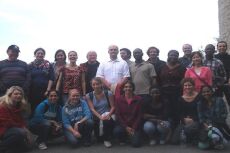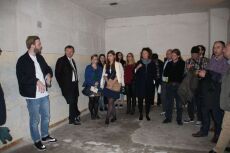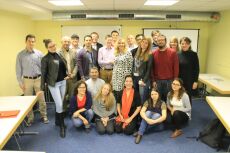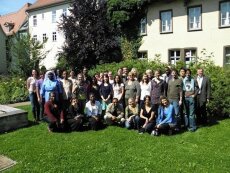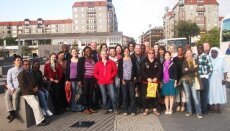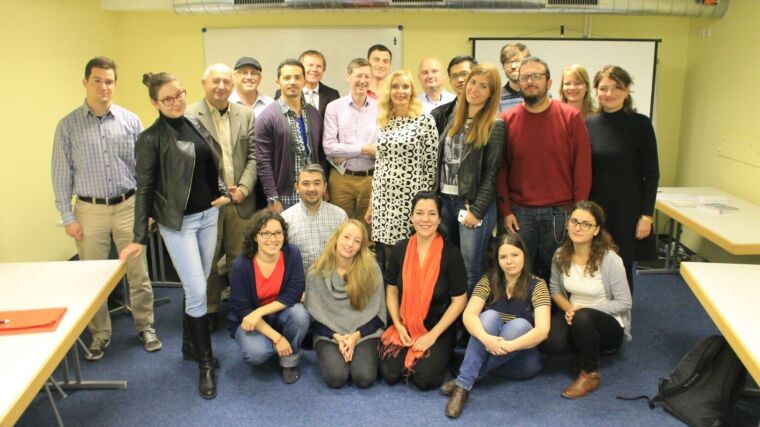
This part of the website is currently under construction. Content and content structure may be subject to changes.
-
5th ISS "The Balkans and the Caucasus between Conflict and Reconciliation" 2015
5th International Summer School "Societies in Transition - The Balkans and the Caucasus between Conflict and Reconciliation", September 27th - October 4th, 2015
From September 27th to October 4th 2015, the International Summer School (ISS) organized by the Jena Center for Reconciliation Studies (JCRS) at Friedrich-Schiller-Universität Jena (Prof. Martin Leiner), the Chair of International Relations at the Institute of Political Science (Raphael Biermann), the American Institute for Contemporary German Studies (AICGS) at Johns Hopkins University (Dr. Lily Gardner Feldman), and the School of Conflict Analysis and Resolution at George Mason University (Dr. Karina Korostelina) gave 15 participants (academics as well as practitioners from the grass-roots level working on conflict resolution and reconciliation studies on the areas in our focus) a platform to present their own research and to work together.
The ISS dealt with conflicts and reconciliation in the geographical region of the Balkan and Caucasus Region from an interdisciplinary perspective. The central question was the possibility of reconciliation processes for and in transitional societies that had recently experienced collapse or any destruction of the internal communication. Similarities as well as significant differences between the two mentioned regions received attention. The International Summer School combined different discussion forms like keynote lectures from theologians, historians, political scientists and sociologists, participants' presentations of ongoing PhD research projects, and also two workshops to deepen some of the topics of reconciliation. The Key lectures, held by well-known experts on Peace, Conflict Resolution, and Reconciliation Studies, addressed the regions of Kosovo, Bosnia, Montenegro, and Serbia (South East Europe); Nagorno-Karabakh; Russia/Chechnya; Georgia/South Ossetia, and Azerbaijan, Armenia, and Turkey (Caucasus/Middle East). They referred to both the relevant past and the possibilities for a peaceful future in post-socialist Europe.
The aspect of the MARTIN LEINER'S lecture presented an overview over the JCRS ́s sphere of activities, commitments and visions for the future within the center ́s "Hölderlin Perspectove". MARIA PALME had a look on the need for reconciliation according to the GDR-past using the example of the federal state of Thuringia. LILY GARDNER FELDMAN gave as a profound analysis of motivations, mechanisms and measurements in the promotion of a path from conflict to reconciliation in the EU, Germany and the Balkans. CHRISTO THESNAAR shed light on the concept of "frozen conflict" as an unstable and insecure situation and critically discussed reconciliation efforts and balances in South Africa referring to the present status as a state in limbo. PHILIPP TOLLIDAY integrated in his key-note speech "Reconciliation: A Negotiation Between Anamnesis and Amnesia" a profound definition of reconciliation into the wider question of the "right remembrance". KARINA V. KOROSTELINA underlined the importance of a critical reflection of one ́s own past for intra-and intercommunal rapprochement citing important challenges. KORNELY KAKACHIA illuminated the concept of borders and borderlands as a dense area and applied his concept to the case in Caucasus region on the basis of a comparative analysis. PAATA ZAKARESHVILI focused on the security needs of Georgia, Armenia and Azerbaijan and underlined Georgia ́s aims and opportunities in strengthening cooperation in the region as a balancing force by enhancing its multilateral ties, mediating in the various conflicts, while also underpinning Georgia ́s efforts to normalize its relations with Russia. RAFAEL BIERMANN critically assessed reconciliation efforts in the Balkan region today while attributing failures and interethnic tensions to a majority ́s attitude of exclusive thinking along ethnic lines.
The workshops provided ample opportunities for in-depth debate among the participants:
1. "Dealing with the Past: Is Remembrance, Trauma and Memory an Obstacle or Catalyst for Reconciliation?" (Thesnaar)
2. "Feeling Foreign in a Familiar Land" (Tolliday)The Summer School also included a field trip to the Weimar Concentration Camp Buchenwald and a two-day trip to Berlin on the occasion of the 25th anniversary of German reunification on October 3, 1990. With these field trips the ISS wanted to contextualize questions of conflict and reconciliation in relation to Germany's memory policies reflecting its efforts of dealing critically with its own authoritarian past.
We are grateful for the financial support of by the Thuringian Ministry for Education and Culture and the Ernst-Abbe-Foundation.
-
4th ISS "Former Soviet Union and East Central Europe between Conflict and Reconciliation" 2014
4th International Summer School "Societies in Transition - Former Soviet Union and East Central Europe between Conflict and Reconciliation", August 22nd - 28th, 2014
From August 22nd to 28th 2014, the International Summer School (ISS) organized by the Jena Center for Reconciliation Studies (JCSR) and the Herder Institute for Historical Research on East Central Europe gave more than 20 participants a platform to present their own research and to work together. The ISS dealt with conflicts and reconciliation in the geographical region of East (Central) Europe from an interdisciplinary perspective. The central question was the possibility of reconciliation processes for and in transitional societies that had recently experienced collapse or any destruction of the internal communication. The International Summer School combined different discussion forms like keynote lectures from theologians, historians, political scientists and sociologists, participants' presentations of ongoing PhD research projects, and also three parallel workshops to deepen some of the topics of reconciliation.
The epistemological aspect of the MARTIN LEINER'S lecture concerned the problem of a definition and a name of any actor of reconciliation. LILY GARDNER FELDMAN (Washington) presented during her lecture the main achievements and ideas of the reconciliation politics between Germany and Poland as well as between Russia and Poland. The theme of dealing with a common violent past was in the center of the lecture by JÖRG LÜER (Berlin). He introduce the participants into the complex problems of dealing with conflicting memories and multi-perspective and developing constructive solutions based on concrete experiences made by the Maximilian-Kolbe-Foundation working with internationals groups in Auschwitz. The current situation of Ukraine was amongst others discussed by ANDRE HÄRTEL (Jena) in his lecture "Ukraine ne Rossija". He pointed on the challenges that emerged after 1991 to the Ukrainian statehood and national-building processes. Basides the historical overwiew, he intorduced three levels of analysis - domestic, regional and international. A keynote lecture based on very up-to-date research was delivered by RAISA BARASH (Moscow) on the divided ethno-national groups in Russia. The central research questions addressed were about Russia identity and the discourse of divided people. INA ALBER (Marburg) tried to summarieze the outcomes of the summer school focusing mainly on the framework of reconciliation.
Another important factor was the personal experience of the participants, almost all of them were originally from Eastern European or post-Soviet states, so the issues like the historical past, reconciliation and transitional justice in this region were always analyzed through the introspective perspective of personal or family experience of living in this region, full of the historical dramas and personal tragedies.
The workshops provided ample opportunities for in-depth debate among the participants. Every participant attended one workshop and chose between the following topics:
1."Reconciliation and collective trauma and memory - A Trans-disciplinary Approach" (Thesnaar)
2. "Feeling 'Out-of-Place': A Narrative of Indigenous Australia" (Tolliday)
3a. Dealing with multi-perceptivity. Momories between Conflict and Reconciliation. Experiences from the work of the Maximilian-Kolbe-Foundation in Oswiecim/Auschwitz (Lüer)
3b. Transitional Justice in East Central Europe in international and comparative perspective (Palme)
-
3rd ISS " Asia and Australia between Conflict and Reconciliation" 2013
3rd International Summer School "Societies in Transition. Asia and Australia between Conflict and Reconciliation", July 17th - 27th, 2013
The international Summer School, "Societies in Transition. Asia and Australia between Conflict and Reconciliation", was greatly appreciated by the 25 participants. At first, Prof.es LEINER and SCHMITZ gave a joint lecture on the innovative potential of Asian concepts of reconciliation and the role of religious approaches. They asked whether the positive acknowledgment of identity changes can have de-escalating effects in a post-conflict situation. On the second day, Prof. WEINKE lectured on the impact of the Nuremberg trials on German society after World War II and the influence of legal procedures on the process of reconciliation. She found that this influence was limited by political continuity before and after 1945 (in West Germany) and by an attitude that, for more than two decades, let the Germans see themselves as victims rather than perpetrators of World War II.
The lecture was complemented by a documentary and an excursion to Nuremberg on the next day, which included visits to the historical building where the trials were held and to the area where the NSDAP held their annual rally. The excursion led to lively discussions during the next days and helped bring together the group through informal conversations about reconciliation concepts and strategies in diverse cultural contexts.
With regard to Myanmar, Prof. YIN showed that the attempted transition from military dictatorship to democracy came with continuing conflicts in some parts of the country. Afterwards, Prof.es LEINER and KITANI compared reconciliation processes in Germany and Japan after World War II. While Germany began to prosecute Nazi crimes in the 1960s, Japanese officials acknowledged the historical injustice committed against its neighbors China and Korea, although these statements sometimes were seen as insufficient. Next, Prof. HAN spoke on the role of memory and education, using as an example the portrayal of violent conflicts and former 'enemies' in history textbooks in South Korea. The next two days dealt with the Indian sub-continent. Dr. FERNANDO discussed the violent conflict in Sri Lanka and different peace initiatives. He concluded that two factors are central: the establishing and holding on to common ground between antagonistic communities (here, the Sri Lankan government and the LTTE/'Tamil Tigers') and the right to democratic self- determination, which should not be understood in separatist terms but imply acknowledgment of similar interests in the 'other' community. In this way, the common struggle for a just and fair society for all citizens is strengthened.
Ms. FEMILA spoke on the conflict between Hindus and Muslims in India, especially after the end of British colonization, and various efforts to look at the roots of the conflict. She pointed to contradictory perceptions of identity (e.g., exclusive vs. inclusive concepts of Indian citizenship) and the fusion of ethnic and religious ideas in the service of nationalism as two central obstacles on the road to conflict resolution.The next two lectures gave an evaluation of the two truth commissions in South Korea (Prof. LEE, Prof. KIM). They acknowledged positive effects (e.g., the uncovering of some serious human rights violations by the government) but also pointed out that the mandate of the commissions was politically charged, e.g. by the question of US-Korean relations. The commission was restrained, and several groups of victims of state violence were disappointed by the outcome of the process, regarding both the public acknowledgment of wrongdoing and the issue of reparations. The importance of official government acknowledgment (e.g., in the form of apology) was also underlined by the lecture of Prof. TOLLIDAY, who presented Australia's protracted conflicts over land and offered an assessment of recent efforts at coming to terms with the past regarding the historical injustice towards the native population.
The workshops provided ample opportunities for in-depth debate among the participants. Every participant attended one workshop and chose between the following topics:
1. "The Croker Island Exodus: Reflections from the Stolen Generations" (Tolliday)
2. "Justice and Reconciliation in Cambodia after the Khmer Rouge Regime" (Sperfeld, Noy, Oung)
3. "Reconciliation, Trauma, and Memory" (Thesnaar)
4. "Buddhist Perspectives on Conflict and Reconciliation - The Case of Vietnam". (Ho)
-
2nd ISS "Sub-Saharan Africa between Conflict and Reconciliation" 2011
2nd International Summer School "Societies in Transition. Sub-Saharan Africa between Conflict and Reconciliation", July 18th - 28th, 2011
Our second Summer School on the topic "Societies in Transition, between Conflict and Reconciliation" was again an overall success, as the comprehensive evaluation by the participants demonstrates. The programme focused on the recent changes in various African countries and societies, seen from different but related perspectives. It consisted of lectures, workshops, the presentation of participants' projects as well as films, an excursion to Berlin, a welcome reception, a farewell party, and a walking tour through Jena. Prof. LEINER offered a brief introduction about the overall concept and design of the Summer School. Afterwards, Prof. RALF WÜSTENBERG spoke about the development in South Africa since 1990. He pointed out that the granting of amnesty for army and police personnel was a precondition for the realization of free and general elections. Yet, this also implied the danger that amnesty is understood as forgiveness, although as a judicial act it does not presupposes a confession of guilt. Thus, amnesty can support reconciliation, but it is not in itself an act of reconciliation. The case of Ruanda shows that due legal process and reconciliation can stand in opposition. We used different media, in order to come to a realistic view of the events in 1994. The evaluation of the process of reconciliation remained ambiguous, since there are several different processes: on the one hand, there is a real overcoming of hatred and forgiveness, economic success and the stabilization of the environment, on the other hand, Hutus are persecuted, and there are arbitrary verdicts, and the suppression of dissent. The lecture by Dr. GLADYS GANIEL showed how civil war and catastrophic turmoil could be prevented in one particular country (Zimbabwe). This was possible by isolating those persons or groups who were willing to escalate the conflict. The Christian church played an important role in the process. Moreover, the emphasis on community, which in Southern Africa is expressed by the word "ubuntu", is an important resource for the resolution of strife and conflict. Prof. REINHART KÖßLER addressed the history of the (former) German colonies in Africa. Again, the limitations of the legal system became clear. The genocide against the Herero in Namibia was dealt with in a US Court, and very high claims of reparation were brought forward. This, in turn, blocked an official apology from the German side. The lecture by Sr. HELEN LAMUNU (Uganda) showed the need for rituals, in order to achieve reconciliation. These rituals can differ from tribe to tribe, but despite the differences in detail they form an essential part of the process of reconciliation. This hypothesis was supported by the work of participants from Ghana and Great Britain. Once more, the workshops were a significant feature of the Summer School. Each participant took part in one of the following workshops:
1. "Reconciliation and Healing" (Dr. Christo Thesnaar)
2. "Case Studies in Sub-Saharan Africa: Patterns and Perspectives" (Dr. Ben Khumalo-Seegelken)
3. "The Colonial Past in the Collective Memory of Germany" (Franka Winter)
We had ca. 50 applications from excellent scholars and professionals, from which we had to choose 30 participants. Eventually, 27 participants came to Jena.
-
1st ISS "Latin America between Conflict and Reconciliation" 2009
1st International Summer School "Societies in Transition. Latin America between Conflict and Reconciliation", July 27th - August 5th, 2009
The Summer School "Societies in Transition. Latin America between Conflict and Reconciliation" was a great success and received high marks.The programme focussed on the historical changes in Latin American societies, as seen from different perspectives. The main part were lectures, workshops, and the presentation of participants' projects. In addition there were films, excursions with guided tours, a reception, a farewell party, and walking tours through Jena.On the first day, Prof. Leiner briefly presented the overall concept of the summer Schools. Patricia Tappatá de Valdez, Executive Director of the human rights organization "Memoria Abierta", then discussed practical questions related to the reappraisal of the military dictatorships in Argentinien und El Savador, where she served as a member of the truth commission.
On the next day, Prof. Elizabeth Lira spoke about the history of Chile, coming to terms with the Pinochet dictatorship. In the evening,we showed the film "The Judge and the General", which focussed on legal and humanitarian aspects and revealed the deep divisions that still exist in Chilean society. After the focus on southern Latin America, there were several lectures and a film related to Central America. Dr. David Tombs shared his expertise on the role of the churches in Guatemala and El Salvador. Prof. Francisco Rojas had prepared a lecture on the causes of the rise of crime in countries like El Salvador and the consequences for peace building processes, but he had to cancel his participations on short notice, due to his invitation to participate in the mediation attempt of the Costa Rican government in the political crisis in Honduras (after the ouster of President Zelaya on June 28, 2009). His lecture was presented by Prof. Lira. A panel discussion in the university book store and a lecture by Prof. Andreas Hasenclever, with a sociological and empirical focus, provided a survey of recent social studies on reconciliation and addressed the question of comparing peace building processes in different countries.
Another important part were the four workshops:
1. Peacebuilding - The Challenge of Coherent Strategies (Flämig,Hasenclever)
2. Mediation - Practical Skills in Managing Conflicts (Clegg)
3. Religion and Reconciliation (Leiner)
4. Dealing with the Past - Latin American Case Studies (Valdez,Tomuschat)
Every participant of the Summer School took part in one of them. Finally, the excursions to Weimar and Leipzig as well as the showing of the Academy Award winning movie "The Life of the Others" led to an inspired critical discussion and brought into conversation the memorialization of recent German history with corresponding processes in Latin America (and South Africa, Iraq, China, Japan, etc.).

